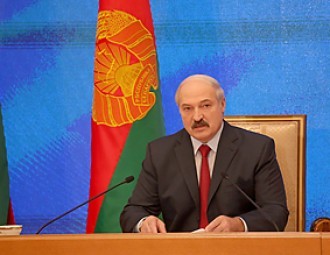Minsk talks on Ukraine can be treated as the start of the president campaign 2015

There is no doubt that if there is any thaw between Brussels and Minsk, Lukashenka will use it as an opportunity both to gain European financial support and as a tool in his relations with Kremlin.
Belarusian president, Aliaksandr Lukashenka, only superficially was a secondary figure of the Minsk summit, whose role was – as he said in an interview for Russian Channel 1 – to take care of prominent guests from Ukraine, Russia, France and Germany.
For him it was also a splendid occasion to show his own citizens that despite the EU sanctions, he is one of the top world leaders who wants to solve the biggest crisis in Eastern Europe after the collapse of the Soviet Union. Moreover, such a meeting can be treated as the beginning of the presidential campaign that will take place this year. Even if with complete certainty we can predict the results, it is clear that images from this event will be present in all pro-governmental mass media in Belarus for a long time. However, having arguments for internal public opinion is not enough, especially since the old story says – politicians of such level do not do anything for free.
Talking about the same old problems with a friend…
Stepping back to the moment when President Vladimir Putin asked his Belarusian colleague to organise the second summit in Minsk, it was obvious that it was not something Lukashenka wanted most. According to rumors – the Belarusian president was waiting for talks about new Russian loans and economic support. This version is even easier to believe when we take into account that the Belarusian currency reserves are shrinking.
In addition to this, export to Russia is also diminishing, which is the main factor stimulating Belarusian GDP. If the conference of the Normand Four was a transaction - meeting in exchange for a loan - sooner or later we will see some new agreement with Russia. Even if the Minsk summit was directly connected with the next Russian loan, Lukashenka still tried to use this event for his own additional purposes.
…and someone who is good to have as a friend
The Belarusian president tried to use the Minsk meeting to exchange a few words with the German Chancellor and French President. Even if there was no occasion to talk about EU-Belarusian relations, he probably tried to present himself not as the last European Dictator, but someone the EU can count on. After that, it is even easier to believe that European leaders will eventually decide to invite him to the Eastern Partnership Summit, which will take place in Riga in May this year, especially since Latvia is perceived as a Belarusian advocate within the EU.
What is more, taking into account the fragile situation in Ukraine, the European friends of Belarus gained an additional argument for inviting the Belarusian leader to Riga. They may present Belarus as stable and predictable state. At the same time there is no doubt that if there will be any thaw between Brussels and Minsk, Lukashenka will use it as a window of opportunity not only to gain European financial support, but also as a tool in his relations with the Kremlin.
Dove of peace?
Last but not least, we could not forget that Lukashenka really wants to stabilise the situation in Ukraine and solve the political and economic crisis in Eastern Europe; even more so since Russia and Ukraine are the two biggest trade partners for Belarus. This means that the economic crisis in both countries seriously hit the Belarusian economy. It should be also noted that Belarus is an additional victim of the Russian embargo for EU food production. Russia accused Belarus of illegal re-export of such products and not only seriously limited its import, but also banned transit of such products between Belarus and Kazakhstan (its partners in Eurasian Economic Union), saying that trucks with food were illegally unloaded in Russian territory. Belarus strongly protested against such actions that broke the Eurasian Economic Union rules, but until now the situation is still not solved. Every Russian decision of that kind causes Belarusian exporters serious losses. Lukashenka counts on improving the relations between Brussels and Moscow also because only the abolition of sanctions and embargos could help Belarusian exporters and only the stabilisation of the situation in Ukraine may lead to it.
Thus, by organising the meeting in Minsk, Lukashenka had his own goals set and only some joke that Belarusian President did it because he counts on the Nobel Peace Prize for such active engagement.
-
03.01
-
07.10
-
22.09
-
17.08
-
12.08
-
30.09








































